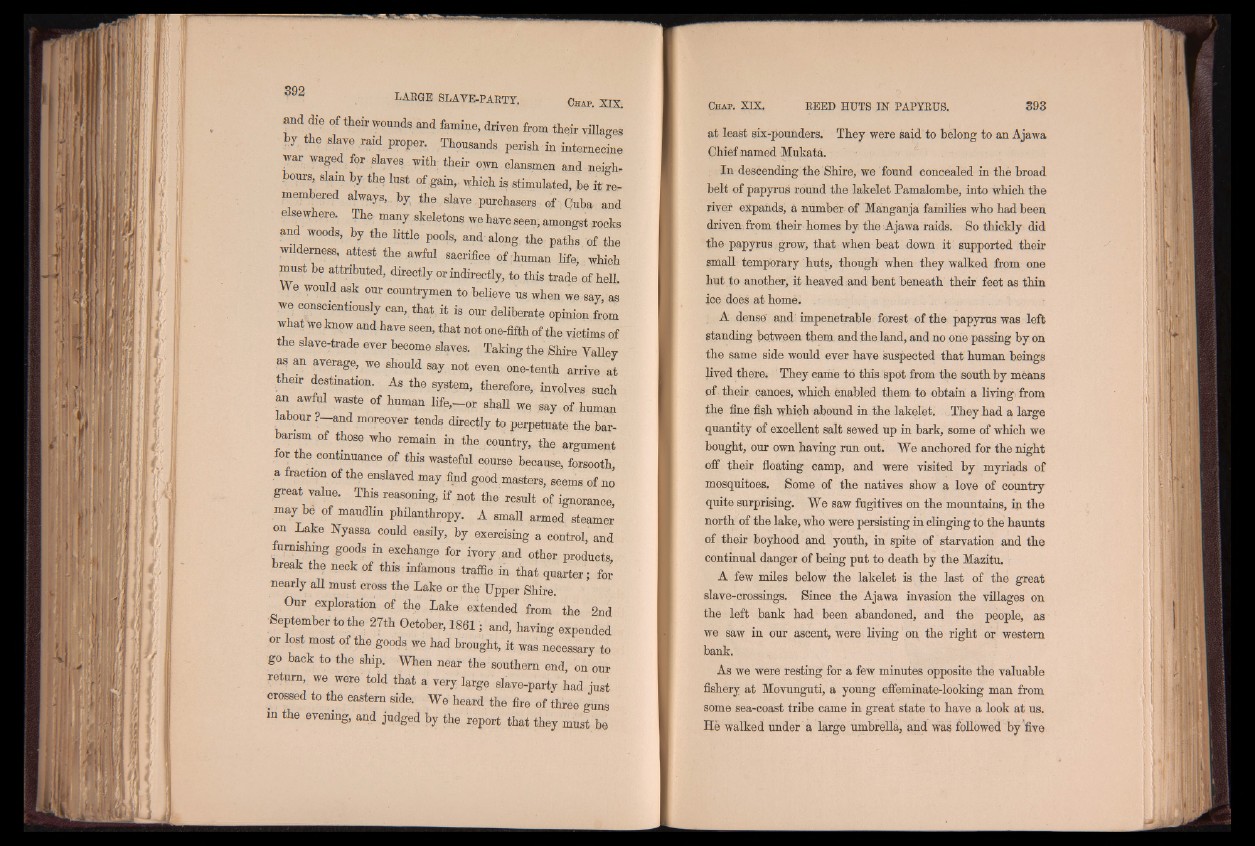
and die of their wounds and famine, driven from their villages
by the slave raid proper. Thousands perish in internecine
war waged for slaves with their own clansmen and neigh.
] ours, slam by the lust of gain,, which is stimulated, be it' remembered
always, by the slave purchasers of Cuba and
e sew ere. The many skeletons we have seen, amongst ¡rocks
and woods, by the little pools, and along the paths , of the
wilderness, attest the awful sacrifice of human life, which
must be attributed, directly or indirectly, to this trade of hell.
We would ask our countrymen to believe us when we say as
we conscientiously can, that it is our deliberate opinion from
what we know and have seen, that not one-fifth of the victims of
the slave-trade ever become slaves. Taking the Shire Valley
as an average, we should say not even one-tenth arrive at
their destination. As the system, therefore, involves such
an awful waste of human life ,-o r shah we say of human
labour ? and moreover tends directly to perpetuate the barbarism
of those who remain in the country, the argument
for the continuance of this wasteful course because, forsooth,
a fraction of the enslaved may find good masters, seems of no
great value. This reasoning, if not the result of ignorance,
may be of maudlin philanthropy. A small armed steamer
on Lake Hyassa could easily, by exercising a control, and
furnishing goods in exchange for ivory and other products
break the neck of this infamous traffic in that quarter; for
nearly all must cross the Lake or the Upper Shire.
Our exploration of the Lake extended from the 2nd
■September to the 27th October, 1861; and, having expended
or lost most of the goods we had brought, it was necessary to
go back to the ship. When near the southern end, on our
return we were told that a very large slave-party had just
crossed to the eastern side, We heard the fire of three guns
in the evening, and judged by the report that they must be
at least six-pounders. They were said to belong to an Ajawa
Chief named Mukata.
: In descending the Shire, we found concealed in the broad
belt of papyrus round the lakelet Pamalombe, into which the
river expands, a number of Manganja families who had been
driven from their homes by the Ajawa raids. So thickly did
the papyrus grow, that when beat down it supported their
small temporary huts, though when they walked from one
hut to another, it heaved and bent beneath their feet as thin
ice does at home.
A dense and impenetrable forest of the papyrus was left
standing between them and the land, and no one passing by on
the same side would ever have suspected that human beings
lived there. They came to this spot from the south by means
of their: canoes, which enabled them to obtain a living, from
the fine fish which abound in the lakelet. They had a large
quantity of excellent salt sewed up in bark, some of which we
bought, our own having run out. We anchored for the night
off their floating camp, and were visited by myriads of
mosquitoes, Some of the natives show a love of country
quite surprising. We saw fugitives on the mountains, in the
north of the lake, who were persisting in clinging to the haunts
of their boyhood and youth, in spite of starvation and the
continual danger of being put to death by the Mazitu,
A few miles below the lakelet is the last of the great
slave-crossings. Since the Ajawa invasion the villages on
the left bank had been abandoned, and the people, as
we saw in our ascent, were living on the right or western
bank.
As we were resting for a few minutes opposite the valuable
fishery at Movunguti, a young effeminate-looking man from
some sea-coast tribe came in great state to have a look at us.
He walked under a large umbrella, and was followed by five